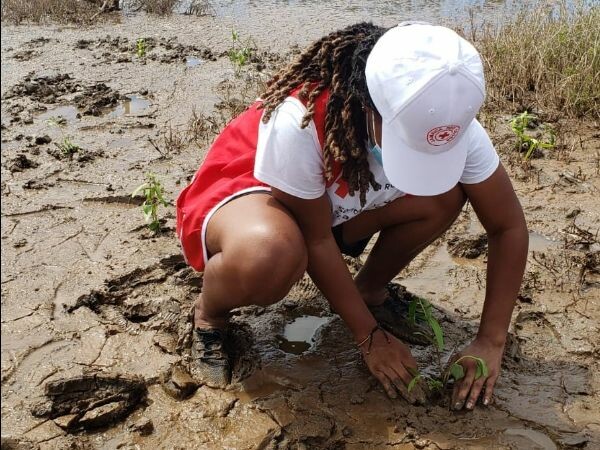
Natural hazards such as tropical storms and coastal erosion threaten the assets and livelihoods of coastal communities.
Within the last decade, there has been a steady increase in the frequency and intensity of such hazards, leaving communities more vulnerable to disasters.
While relief and recovery efforts after a disaster require significant financial and human resources, nature-based solutions are cost-effective, and protect, sustainably manage, and restore natural or modified ecosystems.
By promoting healthy ecosystems such as coral reefs and mangroves, nature-based solutions can reduce the impact of hazards like storm surges and can help communities adapt to their changing environment.
Protecting, managing and restoring ecosystems can also address societal challenges such as climate change, food and water security and disasters, while simultaneously providing human well-being and biodiversity benefits (IUCN 2016).
Since 2018, the International Federation of Red Cross and Red Crescent Societies (IFRC) and The Nature Conservancy (TNC) have been working together under the Resilient Islands Project to help coastal communities in Grenada, Jamaica and the Dominican Republic become more resilient to the impacts of climate change and natural hazards.
Through this partnership, we are working with coastal communities to promote the inclusion of nature-based solutions in laws and policies, while bringing together experiences in science, advocacy, humanitarian actions and community engagement.
In Jamaica and Grenada, the project found that there were several barriers to mainstreaming nature-based solutions in laws and policies such as a lack of value placed on nature resulting in the absence of a common or nationally expressed goal towards climate change adaptation, disaster risk reduction or nature-based solutions.
Additionally, there was a perception of nature as a barrier to economic development and the prioritization of development in key sectors such as tourism and agriculture was justified based on its expected economic impact. As such, there was a lack of understanding of the role and value of natural resources to sustainable development.
Through stakeholder consultations, several recommendations were proposed to address these issues including the development of an overarching policy framework to guide land use and natural resource management and reinforce the importance of nature-based solutions as a more sustainable approach.
To support the implementation of the recommendations, advocacy strategies and roadmaps were developed which included activities to support the building of partnerships and coalitions among key stakeholders; developing communication and educational campaigns; advocacy to support the review and updating of laws and policies; and actions to increase investment in nature-based solutions.
In the Dominican Republic, the project found that the legislative and policy framework needed to be reviewed to ensure better safeguarding of the environment. It was recommended that this could be done through incentives to influence citizen behaviour; community interventions; environmental participatory management that operates through decentralization reforms; knowledge dissemination; and greater community participation in the management of response systems.
The finding and recommendations can be found in our report, "Ecosystem-based Adaptation in the Framework of Disaster Risk Reduction and Climate Change Adaptation Policies".
To promote the findings and recommendations of the research, the report was presented to the Dominican Republic National Emergency Commission by TNC and the Dominican Red Cross. This presentation generated key interest among stakeholders, which led to a follow-up workshop on legislative advocacy for the national authorities that formed the Dominican National Technical Committee for Risk Prevention and Mitigation.
The workshop, which was facilitated by the Dominican Red Cross, TNC, and the IFRC was attended by 17 national agencies (including the Ministry of Public Health, National Geological Service, Ministry of Interior and Police, Ministry of Agriculture and the National Seismic Evaluation Office). The workshop provided a space to talk about key legislative advocacy tools that can be used to support the creation of a committee that would be responsible for advocating for the implementation of the recommendations of the report in the revision of the disaster risk management law.
After five years of collaboration, the partnership between IFRC, TNC and the Red Cross National Societies of Jamaica, Grenada and the Dominican Republic has proven to be a hugely successful one. Multidimensional engagement with government sectors and the community ensured that the needs and priorities at various levels were addressed and relationships strengthened.
Future actions have been mapped to allow for continued engagement beyond the life of the project. Partners have also benefitted from shared resources and expertise in science, policy and community engagement, laying a foundation for future projects to model.
For more information about the Resilient Islands Project: https://en.cruzroja.org/resilientislands